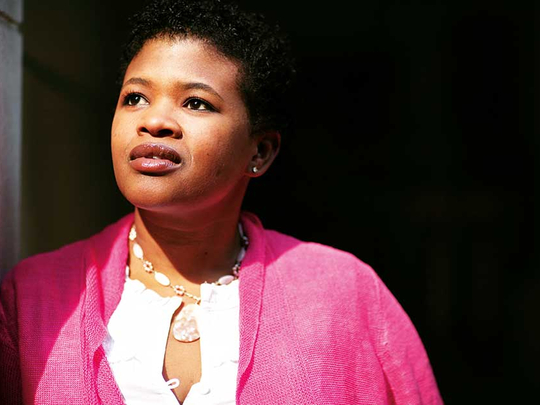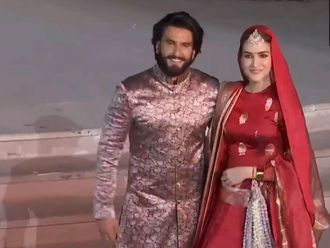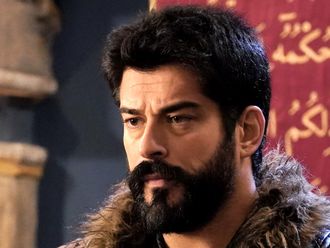
‘I wrote the book primarily in 2016,” Attica Locke says of her new crime novel Bluebird, Bluebird, “so the rise of Donald Trump and of people feeling free to speak their white supremacist beliefs” had begun. The plot revolves around murders with a connection to the Aryan Brotherhood of Texas: “Are you talking about the Klan?” her hero, Darren Mathews, is asked. “Worse,” he replies: “It’s the Klan with money and semi-automatic weapons.” The politics of race saturate the suspenseful tale, which is the first in a series set in the near present day. “When Trump was elected,” Locke tells me, “I remember feeling: oh my God, overnight my book changed, and I didn’t alter a word.”
Mathews, a Texas Ranger beset by difficulties but proud to wear the lone-star badge, is determined to investigate “homicides with a racial element — murders with a particularly ugly taint”. He reflects on the long history of racial prejudice his family has suffered and his recent hope that “change might trickle down from the White House”. But “in fact the opposite had proved to be true. In the wake of Obama, America had told on itself.” Locke has been forthright in her analysis of the discomfort many Americans felt having a black man as president: “A large segment of white folks ... could not take that.” Interviewed hours after Trump’s election, she saw his victory “through the lens of race”, as a “backlash” to Obama.
We talk in the wake of the violent events in Charlottesville, and Locke, who is from the south — she was born in Houston — maintains “there’s nothing surprising to me in what’s happening”. “Everything about Trump has led to #Charlottesville,” she tweeted. She notes the ubiquity of Confederate monuments — “there was a Robert E. Lee high school where I grew up” — and believes it is “dangerous to have these relics of the past unquestioned and all around us ... It’s laced into a child’s unconscious all the time, the region’s racist past”. In other words, “they are tools of white supremacy. They are there to [expletive] with your head.”
“All of a sudden,” Locke says, Bluebird, Bluebird is “resonating in a way that I had not prepared myself for. I was just telling a story that I knew to be true about Texas, but I didn’t know it would speak to something larger.” For her, the most painful aspect of the Trump presidency is ‘realising that there’s no there there with America anymore. What I mean is: if it’s only a set of ideas, only an honour system in which we all follow laws and rules and codes of behaviour, and suddenly we just don’t, where’s the republic? ... I don’t think I realised that nobody would come in to stop this absolute insanity, and get this person out. I didn’t realise the extent to which Republicans would so covet power that they would be willing to let this play out, because we’re in dangerous territory right now.”
The novel is Locke’s fourth, and arrives after a spell of her writing for the enormously successful TV show Empire, the hip-hop music industry saga dubbed the “black Dynasty”. “I missed books, and I missed writing about Texas,” she says. She has lived in Los Angeles for many years, but is a great enthusiast for her home state, and owns a “very big” collection of cowboy boots. In the novel she has given Mathews a similar family history to her own: her people are “from towns along Highway 59, going back to slavery. We are the people who stayed.”
Beginning in the second decade of the 20th century, “there was a great migration of black people leaving the south”. But despite segregation and “Klan terror”, “we set down roots”, she explains. “Part of that was to do with class — we owned land ... we dared anyone to run us off.” Bluebird, Bluebird is, she has written, “a thriller and a character study, but it’s also, at heart, a love letter to black Texans and a thank you to the ones who raised me”.
Locke’s family has an impressive history of public service going back generations, including the first black professor at the University of Texas, Austin, whose experience has helped form one character in the novel. Her mother’s maternal grandmother, who ran a roadside cafe where she cooked food for black travellers, was the direct inspiration for Geneva Sweet, who in Bluebird, Bluebird serves up fried pies and has blues records in her cafe’s ancient jukebox. Her tiny establishment is a kind of antipode to the white supremacist bar just down the highway, whose owner lives in a grand house built to resemble Thomas Jefferson’s Monticello. Two bodies are dragged from the bayou, one a black man, one a local white woman, and gradually Mathews unfolds a complex history of race, sex and miscegenation.
Although Locke swore she would “never write a cop” — her novels Black Water Rising and Pleasantville both centre on a Houston lawyer, Jay Porter — she changed her mind for two reasons. First, she wanted her narrative to be set all along the highway — “a Texas Ranger ranges”. Mathews has a degree from Princeton but knows what it means “to stand on the land where your forefathers had forged your future out of dirt”. (Locke shows me a photo of her father, complete with cowboy hat, on the family land where her grandparents were born.) In writing her black hero as a high-status Ranger, Locke wanted to turn “the image of lone-star swagger on its head”.
The other impetus came in the form of Jill Leovy’s influential study Ghettoside (2015), which tackled a “plague of murders” of black men in south Los Angeles, focusing on how little was done to solve the crimes, “It had a big impact on her “because it flipped the script of only considering the overpolicing of black life, and asked the reader to consider its underpolicing. Mathews was created as someone who could sit on the question: is the law something we can trust to protect us oris it something we need protecting from?”
Locke has said: “I think I get away with a lot of political stuff because of the presence of a dead body. If you have familiar signposts along the way ... readers get comfortable, and then you can slide in all this other material.” Her debut, the Orange prize-shortlisted Black Water Rising (which received plaudits from James Ellroy and Val McDermid among many others), was given an extra dimension thanks to the black activist background of her protagonist, the wary Porter. Both Locke’s parents were themselves in the “movement” at the turn of the 1970s — her father was an associate of Stokely Carmichael and was put on trial. Attica, born in 1974, was named after the 1971 prison riot: “The older I get the more I have an appreciation for my name, it’s almost a mission statement. It has instilled in me a sense of a base level of humanity we’re not supposed to go beneath.”
Her parents divorced when she was young: their marriage, forged in “the excitement and sensuousness and heady intellectual atmosphere of the movement” petered out when the movement did. Her father became a prominent lawyer, her mother a successful businesswoman. “Part of why I wrote Black Water Rising,” Locke says, “is that I grew up with people who had a deep history, one that must have hurt because they didn’t talk about it. I was trying to get under the surface, to explore what it must have felt like to have done all of this amazing stuff at 19.”
Locke was the first black student at an all-white elementary school, an “overwhelming” experience, and later would write stories on her father’s law-practice stationery, even trying to sell them to her high-school friends. But she “didn’t get serious as a writer until I got rejected as a movie director”.
A fellow at the Sundance Institute, Locke aspired to be the next Spike Lee, but though she secured a movie deal, with a story similar to Bluebird, Bluebird, the studio pulled the plug, on the grounds that the film had a black lead but also white characters, and the “world isn’t interested in the rural black south”. “I felt despair,” she recalls. “Back then there was no business model for who I was.”
Her response was to become a Hollywood screenwriter, highly paid and sought after, though “nothing ever got made. It was almost like the old studio system ... This was a time when sequels and superhero movies were starting to ramp up, and I was writing political thrillers and character-based stories. It was fake success, money success. I got disillusioned and walked away.” The cash at least enabled her to put her husband, a public defender, through law school. They met at university, when she was 17. “At first sight, I couldn’t stand him,” she laughs. “He was so weird. He was white. I was a sweet little girl, and he was this guy with long hair, leather jacket, earrings, and he reeked of cigarette smoke. He was so smug! But over time I started noticing things about him that made me question my initial judgment. When we had to make a documentary, he spent a night on the streets of Chicago with a homeless man.”
There was no doubt about the kind of fiction Locke would write: she was always drawn to crime. “I have always been fascinated by the question: why do they think they’re going to get away with it? And the woman in me wants to play these things out in order to feel some mastery and control over a world in which I’m shorter than 50 per cent of the population. I’m scared of everything. But also I think that in essence every novel is a crime novel — crimes of the heart, moral crimes. It’s all about how we deal with different types of scarcity: money, love ...”
When she finally decided on the subject matter of her first novel, she felt she had “come home ... I had shown up as my true self, because when I was a screenwriter, I was frequently praised for being ‘of no colour’; I did what I was asked to do; I didn’t have an identity. With Black Water Rising I vividly remember sitting on the floor of a hotel room and crying: I knew that I was about to announce to the world that I’m black. Which seems dumb, cos ... duh! But what I was saying to the world was: I’m not incidentally black. My world view is black, it’s who I am; there will no longer be any kind of apology for it.”
Locke’s second novel, The Cutting Season, was set on a plantation with slavery in its past and immigrant exploitation in its present; Pleasantville was written in response to witnessing her father’s campaign to become mayor of Houston — “one of the most painful experiences of my life”, due to dirty dealing on the part of his opponents and the local press. The subject-matter suited a return of Porter as the hero. When asked why three of her novels have had male protagonists, Locke has been adamant: “When you’re going through life as a black woman and some weird shit goes down, I don’t go to gender first, I go right to race ... I am black before I’m a woman.”
Locke points out that one of the pleasures of being a writer on Empire was “the lack of a ‘white gaze’”. She was drawn to its theme “of what happens to a family that is wealthy but has no training in generational wealth, which is a particular black thing. That’s a Beyonce story.”
She adds that “everything I was trying to do in movies 20 years ago has moved to TV: it’s where the complex characters are. I really can’t quantify how much fun it was.” Just when her writing contract could have been lucratively renewed, after three seasons, Locke has, however, taken the decision to withdraw from the show, which is far more “soap-operatic” than when it first began.
More important, in writing for the show, she felt too far away from “my actual voice”. Her novels give Locke “a feeling of connectedness to who I fundamentally am” — she is inseparably bound to Texas, with all its “wild contradictions”. On a recent trip to research the second Darren Mathews novel, she stayed in a cabin near Caddo Lake, on the border with Louisiana. “I was too chicken to stay by myself, with, frankly, a bunch of rednecks, so I asked my dad to come with me. And I asked him to bring a gun. I detest guns, and from my point of view, the question is: ‘What do you need guns for?’ But for my dad and my grandmother, who is”, she chuckles, “also quite armed, they are thinking about the Klan.
“With the exception of one town, where I felt an incredible tension, everybody was warm and engaging,” she recalls. “Yet I knew I was standing in Trump country and that these people had just voted to keep white supremacy in place. They didn’t see a hypocrisy in that. It was bothersome. It was frightening — that this might go so much deeper and might be so much harder to extricate.”
Locke’s daughter, Clara, was visiting her grandparents in Houston when Hurricane Harvey struck, and the novelist pays tribute to the “regular citizens who made all the difference: offering their boats, rescuing strangers, offering their homes, their stores for shelter.” She also suggests that “one day when the waters recede, Houston will have to contend with its love affair and addiction to industrial growth. It will be a hard look in the mirror.”
The hurricane is the latest chapter in her family’s long Texan story. Locke becomes visibly emotional when she re-emphasises how much of her own heritage has been folded into Bluebird, Bluebird. The book — “it’s so personal, I can’t really articulate it”- is dedicated to her ancestors, “men and women who said no”. The state depicted in the novel may feature huge images of Trump, a cafe called Kay’s Kountry Kitchen (the initials are a “flagrant act of microaggression”) and “white nationalism” growing like fungus in the “social media swamp”. But Ranger Mathews refuses to leave. “They don’t get to decide what this place is,” he says. “This is my home, too.”
–Guardian News & Media Ltd









